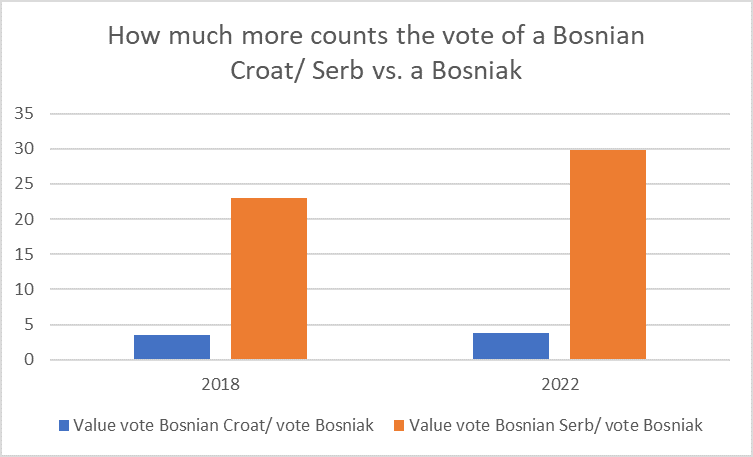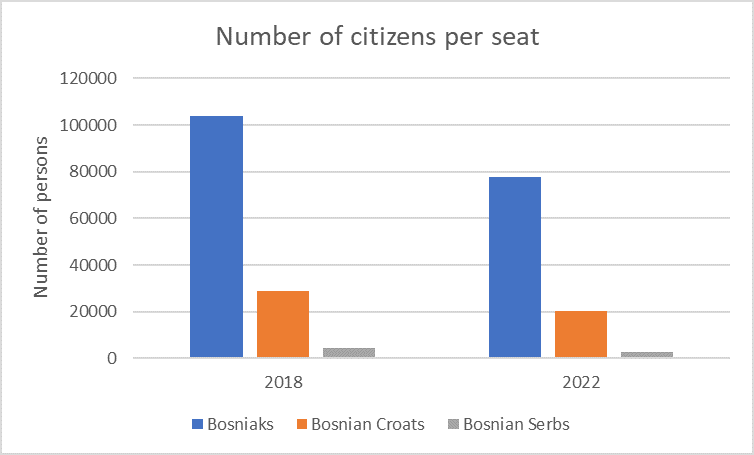What kind of effects does the amendment of the Bosnian electoral law by the High Representative has regarding to the election results concerning the allocation of seats in the Federation of Bosnia and Herzegovina?
Alden Pervan & Ab de Buck October 20, 2022
This memo provides information about the reforms of the Electoral Act as implemented by High Representative Christian Schmidt (hereinafter: Schmidt) on the night of the election (2 October 2022). After the polling stations closed at 7 p.m., Schmidt announced at 9 p.m. the electoral adjustments for the Federation of Bosnia and Herzegovina (hereinafter: FBiH). Schmidt’s adjustment has direct effects on:
- The allocation of seats in the cantons
- The composition of the ‘House of People’
- The choice of president and vice president
We explain this more detailed below. We also make a comparison with the situation in Republika Srpska and discuss the consequences of the adjustment.
1. The allocation of seats in the cantons With the change of the Electoral Act, the number of seats per ethnic group, per canton changes. In the electoral law there was already a very skewed distribution, the new shift reinforces this. Appendix gives the new distribution per canton. Two examples can illustrate this:
* HNK Canton (Mostar): According to the 2013 census, the HNK canton is home to 118,000 Croats, 92,000 Bosniaks and 6,000 Serbs. Under Schmidt’s terms, that canton will delegate five Croats, two Serbs and only one Bosniak to the Federal House of the Peoples. Thus 118 thousand Croats delegate five Croats. Six thousand Serbs delegate two Serbs. And 92 thousand Bosniaks, just one Bosniak. Therefore, a Croat from Mostar is four times more valuable than a Bosniak from Mostar.
* Canton of SBK (central Bosnia, including Travnik/Jajce): 57 percent of the population of the Central Bosnian canton of SBK is Bosniak: according to the 2013 census there are 146,000 people who identify themselves as Bosniak. There are 97 thousand Croats, about 30 percent. There are about three thousand Serbs. High Representative Schmidt now prescribes that two Bosniaks, four Croats and one Serb from that canton be delegated to the House of Peoples of the FBIH. So three Bosniaks from, say, Jajce are worth as much as one Croat from that city.The appendix gives a detailed overview for 8 cantons. On average, there is now one seat per 78,000 Bosniaks, one per 20,000 Croats and one per 2,600 Serbs. The voice of a Bosnian Croat therefore counts 4 times stronger than that of a Bosniak, and that of a Serb even 30 times stronger. See the picture below:
2. The composition of the ‘house of people’ The results gradually affect the FBiH ‘House of Peoples’ (the 1st chamber) of the FBiH: The vote of every delegate has the same value in the FBiH House of Peoples. Schmidt’s change especially strengthens the position of the Bosnian Croats.
3. The choice of president and vice presidentThe imposed decision also increases the number of delegates proposing a list of candidates for the president and vice president of the FBIH from 35 to 48% (from 6 out of 17 delegates to 11 out of 23). This ensures the decisive influence of the HDZ (the ethnic nationalist Croatian party) during the composition of the government in the FBiH, and indirectly at the level of Bosnia and Herzegovina. For the past four years, they have blocked parliament. Their position of power is now even stronger.At the same time, the position of the Bosniaks is further limited by the fact that Schmidt has mandated that Bosniaks be allowed to hold a maximum of one of the three key positions in the FBiH (Prime Minister, Speaker of the House of Representatives of the Federation Parliament and Speaker of the House of Peoples of the Federation of Bosnia and Herzegovina). Also, the Prime Minister and the President of the FBIH cannot be from the same constituent ethnic group.
Summarizing: The intervention in the electoral law further reinforces the inequality between the population groups. The vote of Bosniaks counts much less than that of Bosnian Croats and Serbs (4x and 30x respectively). This is very discriminatory. The adjustment also works in the house of people. There are also unilateral adjustments in the presidency.
Comparison with Republika Srpska The situation in the FBiH is fundamentally different from that in the Republika Srpska. There are Prime Minister and President Bosnian Serbs, and there are no reserved seats for minorities. With his decision, Schmidt contributes to an even more far-reaching organization of both entities, while the goal is precisely further integration and equality. Where there is good reason to protect the rights of ethnic minorities in Republika Srpska, Schmidt omits an adjustment there.The fact that Schmidt is tightening the ethnic division in the FBiH, and leaving the situation in Republika Srpska untouched, reinforces the image that he is acting partisan and has made the adjustments under pressure from the Croatian government.
Effects These actions not only affect the democratic legal order with its norms and values, but also cause further ethnicization of society and the current constitution of the FBiH, which ultimately only benefits the nationalist parties. In this specific case, it provides the nationalist-Croatian HDZ party with a position which makes it impossible in any future democratic way to form a government without this party. In the past four years, the HDZ has completely blocked active functioning of parliament. Their position of power is now even stronger. With his decision, Schmidt abused his powers and undermined the democratic order. In addition, Schmidt’s actions damage not only the reputation of the OHR, but also of Bosnia and Herzegovina, by modifying the Election Law on his own hand on the Election Day, thereby influencing the democratic will of all citizens who voted. These changes to the constitution of the FBiH and its Electoral Act were implemented without the population being informed in advance. The decision is also not compatible with OSCE guidelines. The consequences of his actions are therefore catastrophic. We therefore believe that Schmidt’s actions and decisions showed partiality, a lack of competence and sense of justice, as well as a complete lack of understanding of the complex situation in Bosnia and Herzegovina, which is essential to perform such a responsible function.
In addition, Schmidt has used the 2013 population census in elaborating his decision. However, this violates Annex VII of the Dayton Peace Convention, which states that all refugees must return to their place of residence of origin. Until then, the only valid count is that of 1991.
Moreover, the Dayton Peace Agreement has given Bosnia and Herzegovina a monistic system, i.e., international law has direct effect in the national legal order and is superior to national law. However, Schmidt ignored all five ECtHR judgments (in which the court considers discriminatory aspects of the Dayton Convention problematic and orders Bosnia and Herzegovina to reform its constitution) and gave priority to a judgment of the national constitutional court (Ljubic judgment) that was already implemented by the same court, and completely redundantly used by Schmidt again as an argument to justify his decisions.
Direct consequences for the Dayton Peace Agreement
– Pursuant to Annex 10, the High Representative has the authority to supervise the implementation of the civil part of the Dayton Peace Agreement. This includes, among other things, fair and democratic elections that have been nullified as such with his decision (and the moment at which this decision was taken). In addition, Mr. Schmidt exceeded his powers (misused them for purposes other than those for which they were intended) by making amendments to the Constitution of one of the entities.
– Violation of Annex 4, the Constitution of Bosnia and Herzegovina. In particular Article I/2 which describes Bosnia and Herzegovina as a democratic state under the rule of law, with free and fair elections. The decision goes against this because rules for the implementation of the election results were changed on election day, while the Commission for Democracy and Law (Venice Commission) also maintains a deadline of one year before the elections for changes in electoral law / electoral system.
– Bosnia and Herzegovina has a monistic legal order in which international law has direct effect and takes precedence over domestic law. As a result, various international human rights treaties (Annex I) are part of the domestic legal order, including the ECHR based on Article II/2 (Annex 4). By valuing citizens on the basis of their ethnic origin and favoring them in the context of the implementation of election results, the High Representative violated both the ECHR and the International Convention on Civil and Political Rights.
– The High Representative has unilaterally decided to use different censuses to compose the house of people’s of the Federation of Bosnia and Herzegovina and the its government power, however only the 1991 census is in use to counteract the results of ethnic cleansing. This rule applies until Annex 7, the return of all refugees to their place of origin, has been realised. By applying the 2013 census for the composition of the legislature (in favor of the HDZ), the High Representative has violated Annex 7 and recognized de facto and de jure the results of ethnic cleansing and this Annex, by his actions, declared as realised.
What is needed? We echo the letter signed by several (Euro) parliamentarians, stating that “The OHR’s mandate is arguably the most powerful and far-reaching international oversight structure of any country in the world. The so-called Bonn powers can bypass democratic institutions and decisions if the OHR sees the Dayton Peace Agreement as threatened. Therefore, the holder of this mandate must ensure a high sense of responsibility, integrity, proportionality and respect towards national institutions and citizens. That said, we express our deepest concern about your use of Bonn powers at the close of Election Day.”We therefore ask you to exert influence so that Schmidt withdraws his decisions and the discussion about reforms of the electoral law can take place again where it belongs, namely in the national institutions of Bosnia and Herzegovina and in Bosnia society in general. What is needed is an honest and sincere approach that will enable the country to develop into a fully-fledged democratic society, with a modern system, which gives the country the opportunity to become a full member of the European family.
Appendix: number of seats per canton
Appendix: Number of seats per canton

